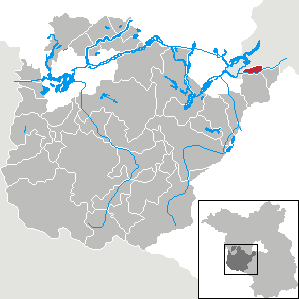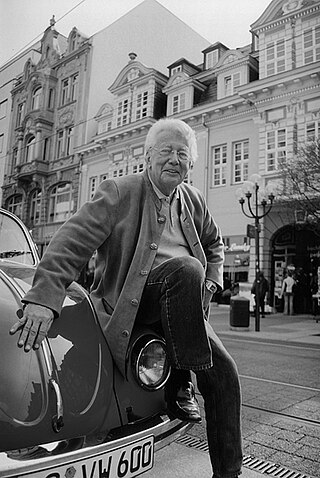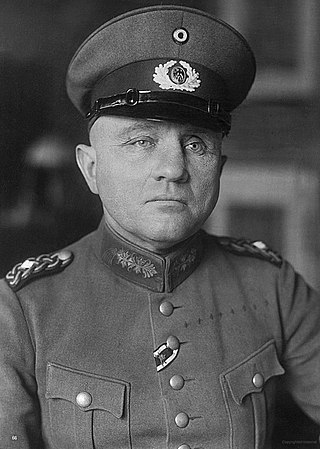
Frederick William IV, the eldest son and successor of Frederick William III of Prussia, reigned as King of Prussia from 7 June 1840 to his death on 2 January 1861. Also referred to as the "romanticist on the throne", he is best remembered for the many buildings he had constructed in Berlin and Potsdam as well as for the completion of the Gothic Cologne Cathedral.

The Order of Merit of the Federal Republic of Germany is the only federal decoration of Germany. It is awarded for special achievements in political, economic, cultural, intellectual or honorary fields. It was created by the first President of the Federal Republic of Germany, Theodor Heuss, on 7 September 1951. Colloquially, the decorations of the different classes of the Order are also known as the Federal Cross of Merit.

The Bailiwick of Brandenburg of the Chivalric Order of Saint John of the Hospital at Jerusalem, commonly known as the Order of Saint John or the Johanniter Order, is the German Protestant branch of the Knights Hospitaller, the oldest surviving chivalric order, which generally is considered to have been founded at Jerusalem in 1099.

Prince Oskar Karl Gustav Adolf of Prussia was the fifth son of German Emperor Wilhelm II and Augusta Victoria of Schleswig-Holstein-Sonderburg-Augustenburg.

Kleinmachnow is a municipality of about 20,000 inhabitants in the Potsdam-Mittelmark district, in Brandenburg, Germany. It is situated south-west of the borough of Steglitz-Zehlendorf and east of Potsdam.

Prince Frederick Charles Alexander of Prussia was a younger son of Frederick William III of Prussia. He served as a Prussian general for much of his adult life and became the first Herrenmeister of the Order of Saint John after its restoration as a chivalric order. Nevertheless, he is perhaps remembered more often for his patronage of art and for his sizable collections of art and armor.

The Order of Merit of the German Eagle was an award of the German Nazi regime, predominantly to foreign diplomats. The Order was instituted on 1 May 1937 by Adolf Hitler. It ceased to be awarded following the collapse of Nazi Germany at the end of World War II in Europe. The wearing of the Order of Merit of the German Eagle is prohibited in the Federal Republic of Germany.

Christina Klein, better known by her stage name LaFee, is a German pop singer and television actress who has sold more than one million records worldwide. She is most famous in mainland Europe, particularly in German-speaking countries.

Crinitz is a municipality in the Elbe-Elster district, in Lower Lusatia, Brandenburg, Germany.

Günter de Bruyn was a German author.

Andreas Dresen is a German film director. His directing credits include Cloud 9, Summer in Berlin, Grill Point and Night Shapes. His film Stopped on Track premiered at the Un Certain Regard section at the 2011 Cannes Film Festival, where it won the Prize of Un Certain Regard. Dresen is known for his realistic style, which gives his films a semi-documentary feel. He works very teamoriented and heavily uses improvisation. In 2013 he was a member of the jury at the 63rd Berlin International Film Festival.
Helmut Schwarz is a German organic chemist. He has been a professor of chemistry at the Technische Universität Berlin since 1978. In 2018, he was elected a foreign associate of the U.S. National Academy of Sciences.

Dieter Thomas Heck was a German television presenter, singer and actor. He is known as the presenter of the popular TV program ZDF-Hitparade, featuring German Schlager music, from 1969 to 1984, reaching millions of people. As an actor, he starred in the TV play Das Millionenspiel in 1970.

Order of Merit of Baden-Württemberg is the highest award of the German State of Baden-Württemberg. Established 26 November 1974, it was originally called the Medal of Merit of Baden-Württemberg. Effective 26 June 2009, the medal assumed its current name. The order is awarded by the Minister-President of Baden-Württemberg for outstanding contributions to the state of Baden-Württemberg, in politics, society, culture and economics. The order is limited to 1,000 living holders, and has been awarded 1,923 times, as of 30 April 2018.

The Order of Merit of Berlin is this highest award of the German State of Berlin. Awarded in the name of the Senate of Berlin, the order had recognized outstanding contributions to the State of Berlin since 21 July 1987. Awarded each year on 1 October, the anniversary of the Berlin Constitution, the order is limited to no more than 400 living recipients. As of 2016 the order had been awarded 431 times, to 152 women and 279 men.

The Lower Saxony Order of Merit is a civil order of merit, of the German State of Lower Saxony. The order was established 27 March 1961. The order is presented in three classes, the highest is the Grand Cross of Merit, the next is the Cross of Merit First Class, and the lowest is the Cross of Merit on Ribbon.

The Order of Merit of Rhineland-Palatinate is a civil order of merit, of the German State of Rhineland-Palatinate. The order is presented for outstanding service to the state and people of Rhineland-Palatinate. It was founded on 2 October 1981, and first awarded in 1982. The order is limited to 800 living recipients. Through 2012, the order had been awarded 1035 times.

Karl Ernst Manfred Freiherr von Richthofen was a German General der Kavallerie during World War I and recipient of the order Pour le Mérite, known informally as the Blue Max. Richthofen was a great uncle of his more famous namesake Manfred von Richthofen, known as the Red Baron, who was his godson and named after him.
The orders, decorations, and medals of the German states, in which each states of Germany has devised a system of orders and awards to honour residents for actions or deeds that benefit their local community or state, are in turn subsumed within the German honours system. Each state sets their own rules and criteria on eligibility and also how each medal is awarded and presented. Most of the orders allow for the recipient to wear their orders in public.

Hugo Max von Kayser was a German General of the Cavalry of World War I. He was known for being a major military figure of the Reichswehr after the war's conclusion, commanding the 2nd Cavalry Division.


















